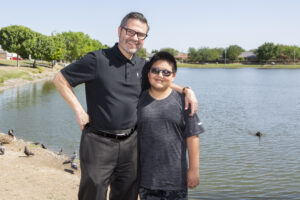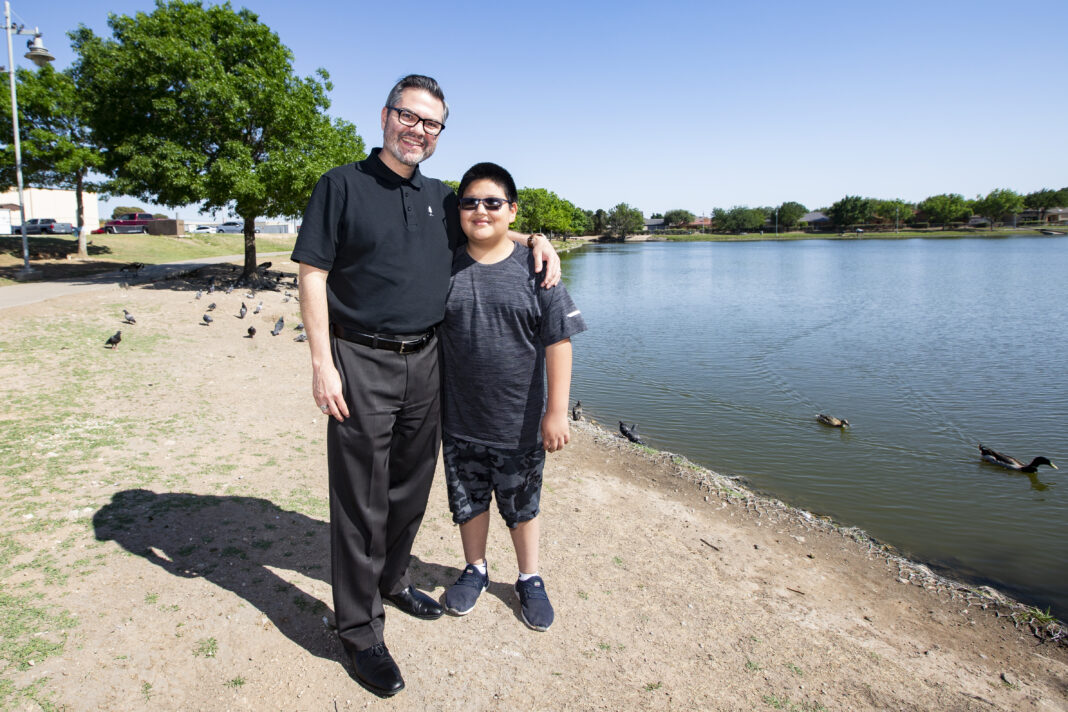Jonathan Garcia doesn’t have any siblings.
Yet for the last two years, he’s had a mentor through the Big Brothers Big Sisters of the Permian Basin program.
Adrian Vega, who works as a community development officer for The Sewell Family of Companies, was paired up with Garcia and the two have enjoyed spending time together. Even the pandemic didn’t separate them.
Before COVID-19 became widespread, the Big Brothers Big Sisters program in Odessa was school-based only.
“What that meant was that I would go to Jonathan’s school and hang out with him on campus,” Vega said.
However, when the pandemic came in to play, it shifted to being a community-based organization since the bigs weren’t allowed to go on campus.
“What that allowed was more freedom as far as us being allowed to schedule times to meet,” Vega said. “The time that seems to work for us is Saturday afternoon.”
Because of the different schedule, Vega and Garcia have been able to do a lot more activities from going to restaurants to going the park.

“When we first started hanging out, we were limited by what we could do so during those times we would play board games and cards and talk and just hang out by playing games,” Vega said. “Once we were able to have more freedom, as far as not being attached to the school, we’ve done a number of things. We’ve gone to the museum. We’ve walked around. We’ve come to the mall. We’ve gone to UTPB.”
For Garcia, who is 11 years old and is a sixth grader at Nimitz Middle School, it’s been fun being in the Big Brothers Big Sisters program.
“I like that it’s giving you a lot of opportunities to see the world and sometimes take away your anxiety,” Garcia said. “It helps a lot. It takes away your social anxiety especially when you have someone to talk to.”
As far as who would win the most games, Garcia was reluctant to say his big would take the bragging rights, just barely.
“Most of the time, it was even,” Garcia said. “Like, it would be who had the most skill or just the most luck. Usually, it was him because I didn’t know how to play some of those games properly. He would win most of them.”
Vega and Garcia are two of many people who are paired up in the Big Brothers Big Sisters of the Permian Basin.
Currently, the Big Brothers Big Sisters of the Permian Basin has 82 matches, which include both Midland and Odessa.
However, while Vega and Garcia weren’t affected by the pandemic, the program has been trying to get back to normal after the disruption this past year.
That includes the Odessa-based program which was only started in 2018.
“We started at one elementary school and we expanded to three schools and we were beginning to pick up momentum but then COVID hit,” Big Brothers Big Sisters Permian Basin Executive Director Kay Crites said. “The schools shut down and that’s all we had in Odessa at the time.”
And when the schools shut down, the program had to make some adjustments.
“We transitioned as many as we could to our community program where they can get together outside of the school but some people weren’t comfortable with that and we understood that,” Crites said. “If they were matched, they were able to meet virtually in order to keep the match going.
With the world slowly returning back to normal, Crites says the organization is in need of peers.
“Currently, I have many more children waiting than I have volunteers,” Crites said. “I think we have only four volunteers right now who are waiting to be matched.”
The organization has been trying to reach out. That’s been challenging at times as Crites says their best recruiting methods for children and volunteers is to be out in public, attending events.
“We couldn’t do that much last year but events are starting to come back,” Crites said.
That includes Midland RockHounds and other events but without volunteers, the organization can’t recover.
“We’re beginning to get back out but we really need people to understand how badly and how hard it hit the program,” Crites said. “Volunteers are important for any program and ours wouldn’t exist without them. We’re based on volunteers and if we don’t have volunteers, we don’t have a program.
Like most people around the world, Crites says the children in the Big Brothers Big Sisters have been through a lot in the past year because of COVID.
“With parents being laid off and schools being shut down, they’ve lost their socialization,” Crites said. “Some of them lost ready-access to food. Parents may have been laid off. They had no release, unless they could meet up with their big brother, virtually. We have children who have been through all of this. They really need someone to just listen.”
It’s made it even more vital than ever for volunteers to help out at Big Brothers Big Sisters. Crites added that a lot of the children in the organization are from low-income homes.
“Twenty-eight percent have at least one parent in prison,” Crites said. “Eight percent are living with a family member other than their parents. Mentoring gives these children an opportunity. Sixty-eight percent of our children in our program are being bullied either at school or at home. Having a mentor that will validate their self-worth and let them know that they matter enough to make time for them, it’s amazing what a difference a little time makes to a child and showing them that they matter can make.”
The process of matching bigs up with littles takes a number of things into account.
“We match our bigs and littles based on personality types,” Crites said. “They’ll do things that interest them. Maybe they’ll play disc golf or regular golf. That’s when they’ll open up and tell you what’s going on with their lives.”
Volunteers range from high school on up.
“If they’re a sophomore and 16, they can enroll in the high school program and we have volunteers up until they are in their 80s,” Crites said.
The ultimate goal, for the children, is to help them grow up to be productive members of society.
“They are our future co-workers and future neighbors,” Crites said. “We want them to grow up and graduate from high school. We encourage them to stay in school and graduate from high school and encourage them to have a plan after that, whether it’s further education or a trade that they can contribute to our communities.”
But not only is the program looking for volunteers and children but it are also looking to reinvigorate its committee with some new members.
Crites says the key to expanding the reach into the community is a strong committee with members who have good community contacts.
That committee is tasked with directing the program in Ector County and assisting in the overall success of the program throughout the Permian Basin.
The committee meets monthly from 4:30-5:30 p.m. on the second Monday of each month.
Those who are interested should contact Crites at [email protected] or at 432-687-0195.
For Vega, it’s been a fun opportunity to be involved with Big Brothers Big Sisters.
“My father was a Methodist minister and my mom was a social worker,” Vega said. “What that meant for us growing up, it was instilled in us to give back and to serve and to be in relationship with others in the community. I grew up with that mindset. When given the opportunity to do this, I thought this would be a great way to give back and pour into the life of another man. I have two kids of my own. My son is a freshman in college and my daughter is a junior in high school. God has blessed us with being able to provide for them, but at this moment I just had time to invest in another young person.”
Those who are interested in volunteering in the program can go to https://tinyurl.com/2ds5x3s4.




